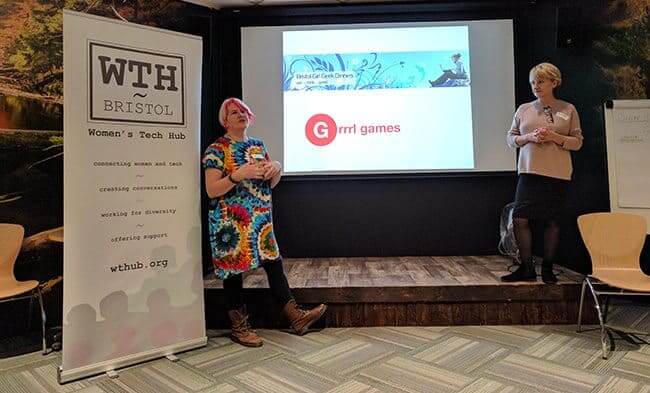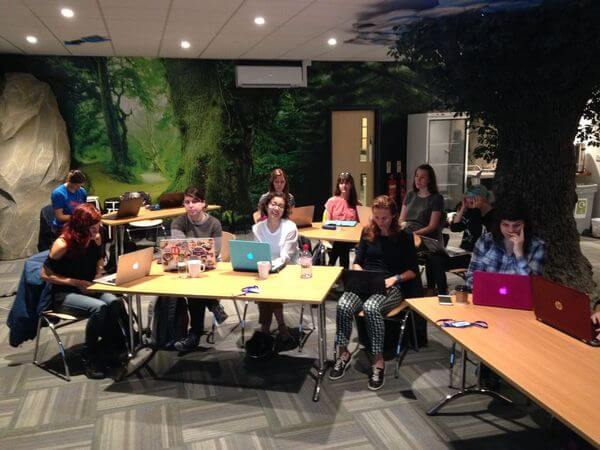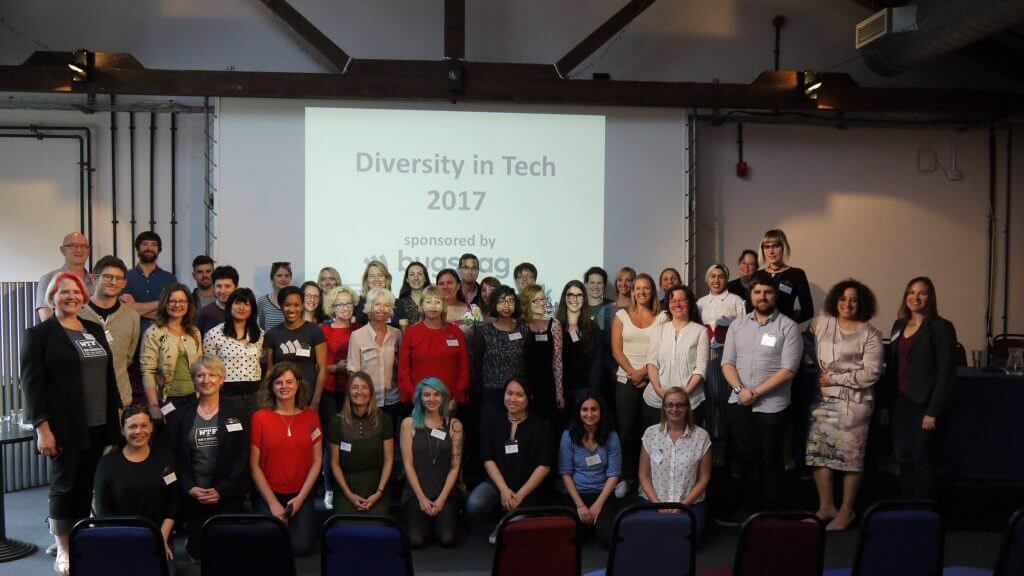At school, Serrie Chapman was told she couldn’t be an engineer – even though maths and physics were her top subjects. These days, she’s an experienced engineering consultant and co-founder of the Women’s Tech Hub, supporting women to advance their tech careers.
Women’s Tech Hub (WTH) started as a website for sharing jobs, opportunities and information for female tech workers in the Bristol area. Now, it’s a thriving not-for-profit, with nearly 800 members in its meetup group alone.
Here’s how they’re helping women get hired – and tech companies to hire more women.
Hi Serrie, how did WTH get started?
Women’s Tech Hub Bristol grew from our shared love of working in tech, alongside our awareness of the lack of diversity.
Constance [Fleuriot] and I decided to set up a website to centre the information and then Thanh [Quan-Nicholls] from Desklodge offered us free networking space on a Friday as a temporary Hub. We’re still there and Thanh joined us as a co-founder.
Our mission is to support the development of a tech industry that’s inclusive of all – that reflects the wider society that it exists to serve.
We support and encourage women and gender non-conforming folks working in tech to develop new pathways into working in our industry.
We also work with our members to develop their confidence and skillsets, share useful information for individuals and businesses in our network, and encourage companies to create inclusive workplace cultures and recruitment processes that welcome underrepresented groups.
Who is WTH for?
It’s for all women (anyone who identifies as such) who are currently in tech, looking to move into or across tech, tech-curious women and returners.
We’re also there to speak to the industry and help them gain an understanding of what they can do to support or engage with women. This came about because of a conference I was speaking at, where a man said that they have jobs advertised but no women apply for them. I asked him who was at fault, the women or the company, at which point he looked dumbfounded. We realised there was a missing link between the women’s support networks and the industry itself so decided to open up the conversation.
So we are for both women and the tech industry and we try to break down the barriers between them.

What kind of events do you run?
We always run Free Three Fridays at Desklodge from 10am – 1pm on a Friday, where we get a lot of women coming in looking to find a network or jobs.
We run social events that are open to all – male members are welcome to come along to these too. We’re also looking to partner with companies that can run workshops for free or at discounted rates for our members (many are in hardship through poorly paid jobs, being single parents etc and we like to be inclusive).
We ran a conference last year and are looking at running one next March to cover training, apprenticeships, recruitment, showing women what jobs are out there and how they can make a move into the industry.
What diversity issues do we have in the Bristol tech scene?
I don’t believe it’s specific to Bristol – generally, women have been put off engineering and tech roles. Women often find difficulty getting into the industry or returning to it after a break. It’s noticeably worse in the UK and the US compared to other countries, so I believe it’s a cultural issue.
I think the US and the UK have a cultural mindset that aligns tech jobs as jobs for men, not women. We have ex-east germans at Women’s Tech Hub who said that 50% of programmers were women in East Germany – they were shocked when the wall came down and they couldn’t find jobs.

How do you support startups to become more diverse?
In reality this is difficult, as some of our women require more flexible hours or re-skilling and startups struggle as they’re limited on time and resources.
We’re looking to train up women through womenstechjobs.co.uk so they’re ready to join startups without the overheads. We can use the apprenticeship levy to support the scheme and have plans to set up a central Women’s Tech Kitchen to acts as a central point.
Through this, we can identify issues that women have with their companies and effectively act as their voice if they feel they have none. We don’t believe in naming and blaming but reporting and supporting companies that want to do better.
What advice would you give to a company that’s trying to hire more women?
Be aware of unconscious bias, not just in the recruitment process but in the workplace. Wording job ads carefully, not asking for gender on applications and being aware of assumptions you may be making can all help to alleviate the bias.
I would suggest that people run their ads through the gender decoder, a free tool. There are also paid tools out there that have a more granular view on gendered language.

What can a new member do to make sure they get the most out of the meetup?
Just come along – we aren’t expecting anything from you and are happy to discuss any questions you have. We’re here to support our members and get a bit ‘empty nest syndrome’ when they move on, even if it’s for a great new job! Hence the social events for our members and alumni who can no longer make the Friday meetups.
We have job listings on our website so you can see what might be of interest. We also have links for free training and have partnered with QA for accredited training.
Do you have sponsors? What does sponsorship allow you to do?
All WTH companies get a yearly gender diversity audit with analysis and suggested solutions – we hope that they react positively to this ‘nudge’ and see an improvement over time.
We can also quickly pick up when there’s been a negative effect and look for the source of any issues – this gives businesses an awareness of their culture and leads to better employee retention. Then we can showcase our companies and Bristol itself as gender friendly places.
We analyse the data yearly, identify any issues and highlight communication or processes that need improving in the industry. We also give sponsors two free ads on our jobs board and share information about upcoming gender-related legislation and incentives such as the apprenticeship levy.
What’s your long-term vision for the organisation?
We want to make Bristol an outlier in the national statistics for gender disparity in the UK. But the tech industry needs to improve for women nationwide – not only in the south-west. We plan to eventually franchise the business model to other cities so that we can have a WTHub in every city that needs support.
Find out how you can get involved on the Women’s Tech Hub website.